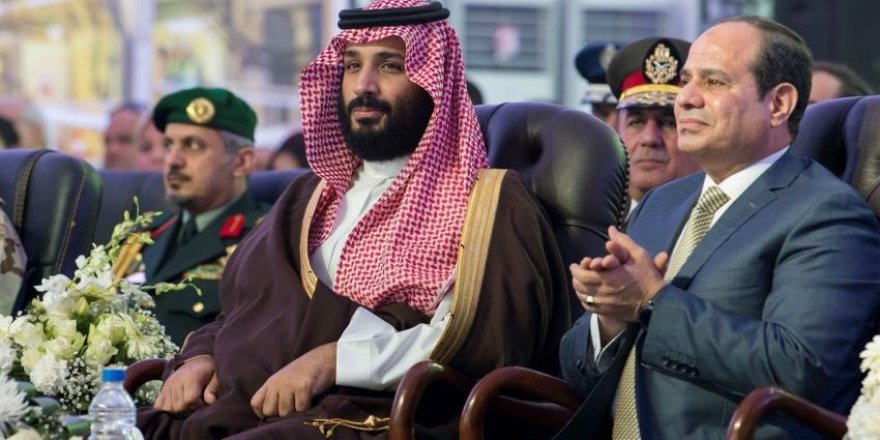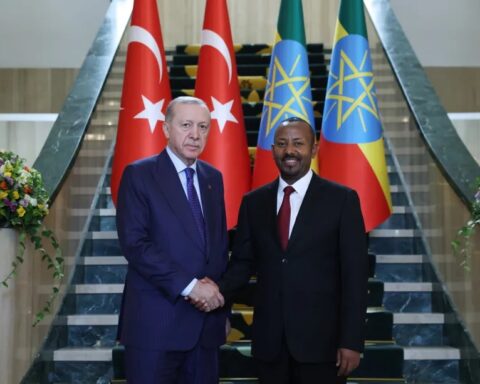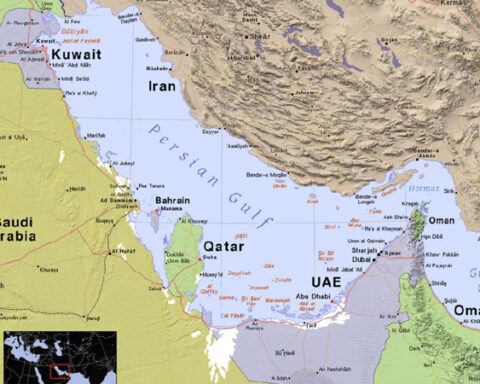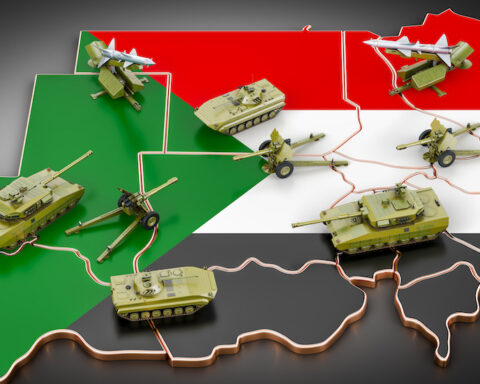Last May, when the US–Gulf summit in Riyadh ignored inviting Egyptian President Abdel Fattah El-Sisi, it appeared that something was troubling relations between Saudi Arabia and Egypt.
And when the Saudi Crown Prince, Prince Mohammed bin Salman, was absent from the Sharm El-Sheikh Peace Summit last month, it became clear to everyone that tensions between Riyadh and Cairo were at their peak.
Egypt’s Foreign Minister, Badr Abdel Aaty, denies claims of tension in relations between the two countries, stressing that “Egypt and Saudi Arabia are the two wings of the Arab and Islamic nations, and the relationship between them is certainly solid, rooted in ties of kinship and in historical and everlasting bonds.” However, he acknowledged a few days ago, in a televised interview on the private channel Al-Nahar, that there are third parties (whom he did not name) trying to fish in troubled waters.
Contentious Issues
There are factors that could create discord between the two countries or fuel tensions between them. This is what former Egyptian Foreign Minister Amr Moussa warned against when he wrote on his X page last May, saying: “The strong relationship between the Kingdom of Saudi Arabia and Egypt is a main pillar of the Arab world, and there are those who now seek to break it,” in a clear reference to the atmosphere of anxiety and mutual barbs between the two countries.
Speculation continues to circulate about whether there are disagreements between the two countries — perhaps due to differences in strategic outlook, a conflict of interests, or the presence of those who wish to fan the flames of this dispute.
From time to time, exchanges and disparaging campaigns erupt on social media, led by activists and media figures from both countries, some of whom are connected to security and sovereign bodies. This appears to point to genuine tension behind the scenes, a strategic divergence in interests and political positions, and a struggle over regional influence that is no longer hidden from view.
The Syrian file is considered one of the most prominent points of disagreement between the two countries, especially with Riyadh accelerating its steps to support the new Syrian president, Ahmed Al-Shar’a, promote his regime to the US administration, and arrange a meeting for him with President Donald Trump during his visit to Riyadh a few months ago. That visit culminated in the announcement of lifting sanctions on Damascus, followed later by removing Al-Shar’a and others from the “terrorism” list, and his reception at the White House this month.
The Saudi track has heightened Cairo’s frustration. Egypt is showing extreme caution in dealing with Al-Shar’a’s government, which toppled the regime of the ousted president, Bashar Al-Assad — a leader who had enjoyed El-Sisi’s support. El-Sisi fears a renewed reproduction of the Arab Spring uprisings and the possibility that the Syrian model could be invoked against his own rule. He also views with suspicion Damascus’s refusal to hand over Egyptian nationals wanted by Cairo who had been among the ranks of armed groups opposing Al-Assad’s rule.
Gaza and Sudan
Alongside the Syrian file, there are two highly sensitive issues that are fuelling the Egyptian–Saudi dispute. The first concerns the war in Gaza and the success of Cairo and Doha in reaching a ceasefire agreement without undermining the capabilities of the resistance. Saudi Arabia, however, has rejected taking part in the reconstruction of the Gaza Strip under Trump’s plan to end the war, unless Hamas is disarmed and the Palestinian Authority assumes responsibility for governing the Strip — according to what Israel Hayom, citing a Saudi diplomatic source.
The second issue centres on Egypt’s insistence on the need to support the Sudanese army and enable it to assert control over the country. This comes amid Egyptian reservations about the Saudi–Emirati support for the Rapid Support Forces led by Hemedti, who had deployed his troops as part of the Saudi-led coalition in the Yemen war, and had also provided units to help guard Saudi Arabia’s border with Yemen.
This difference in visions, positions, and interests has extended to other files. These include Egypt’s rapprochement with Iran and Cairo’s adoption of a mediating role between Tehran and the International Atomic Energy Agency without informing Riyadh in advance — a move that angered the Saudis. It also includes Egypt’s entry into the Lebanese crisis, considered a sphere of Saudi influence, and the ongoing dispute over the identity of the next Secretary-General of the Arab League, who is to succeed the current holder of the post, the Egyptian Ahmed Aboul Gheit, whose term ends in June 2026. Riyadh has also expressed displeasure at Egypt’s continued monopoly over both the headquarters and the position.
Shifting Balances
Differences in political outlook and shifting balances of power — along with an international context that highlights Saudi Arabia’s role in regional files and places it ahead of Egypt in the eyes of the US administration, set against Egypt’s efforts to rebuild its strength and regional standing, particularly in the Levant, the Nile Valley, and the Horn of Africa — are all factors that could generate disagreements and tensions between the two countries, according to political researcher Mohamed Gomaa.
Beneath the surface lie dynamics fuelling political estrangement between the two sides, especially from Saudi Arabia’s perspective. Riyadh believes it stood firmly behind El-Sisi’s regime after the 3 July 2013 coup, providing generous financial and economic aid packages, yet he did not return the favour. When Saudi Arabia requested Egypt’s participation in Operation Decisive Storm against the Houthis in Yemen, Cairo declined. Added to this was El-Sisi’s procrastination in handing over the islands of Tiran and Sanafir, as well as what appears to be a growing Egyptian inclination towards Abu Dhabi, which is itself competing with Riyadh for Gulf and regional leadership.
Means of Pressure
The rising friction between Riyadh and Cairo has been reflected economically, with Saudi Arabia freezing investment projects in the Red Sea and suspending a major financial deal to purchase Ras Gamila, located near the Sharm El-Sheikh resort — a deal similar to the financial rescue agreement concluded between Egypt and the UAE to purchase Ras Al-Hekma on the Mediterranean for 35 billion dollars in early March 2024.
As part of activating economic means of pressure on Cairo, Riyadh has been showing hesitation and delaying any further investments into the Egyptian market, despite the Egyptian parliament’s approval last March of the Saudi–Egyptian Investment Promotion and Protection Agreement, which came at Riyadh’s request due to problems facing Saudi investors in Egypt — mainly restrictions on transferring profits abroad, in contrast to the treatment received by Emirati investors. At that time, pending transfers had reached five billion dollars, according to the independent outlet Mada Masr.
The Egyptian political analyst Farag Ismail highlighted part of Saudi Arabia’s means of pressure. In a recent post on his personal Facebook page, he pointed to the halt of the “Mousa Bridge” project — or the King Salman Bridge — announced by Saudi Arabia in 2016 to link Egypt and Saudi Arabia across the Red Sea. He noted that “the project has been halted and is under study for environmental, security, engineering and political reasons.”
The repercussions of political tension have spilled over into the entertainment sector. Saudi Arabia’s entertainment chief, Turki Al-Sheikh, announced the exclusion of Egyptian artists from this year’s Riyadh Season events. Smear campaigns targeting the senior Saudi official — who is close to bin Salman — also intensified, including describing him as a “bag of rice”. Moreover, Egyptian artists at odds with him were invited to take part in a national celebration attended by the Egyptian president last October.
Strategic Dialogue
The researcher and academic Hamdi Al-Masri told Middle East Monitor that the fundamental disagreements between Cairo and Riyadh require each side to clearly define their objectives, and for their wills to align on critical issues such as Palestine, Syria, Sudan and the Red Sea.
In an article titled “This Is Where a Strategic Egyptian–Saudi Dialogue Begins”, the Egyptian journalist Abdel Azim Hammad — writing on the independent platform Masr 360 — called for regulating relations and strategic priorities between Egypt and Saudi Arabia, and for establishing a forum for strategic dialogue between the two countries at the level of experts, thinkers and decision-makers in both countries.
The points of dispute and unresolved issues remain an obstacle to reducing tensions between two major Arab states. Yet the imperatives of the Egyptian–Saudi alliance also appear numerous, logical and unavoidable, given the security of the Red Sea and Bab Al-Mandeb, the risks posed by Israel’s ambitions after its strike on Qatar last September, and the need to maintain a balance of deterrence in the region — all of which call for agreement rather than confrontation to safeguard the shared interests of both states.
Source: https://www.middleeastmonitor.com/20251118-a-hidden-egyptian-saudi-conflict/






